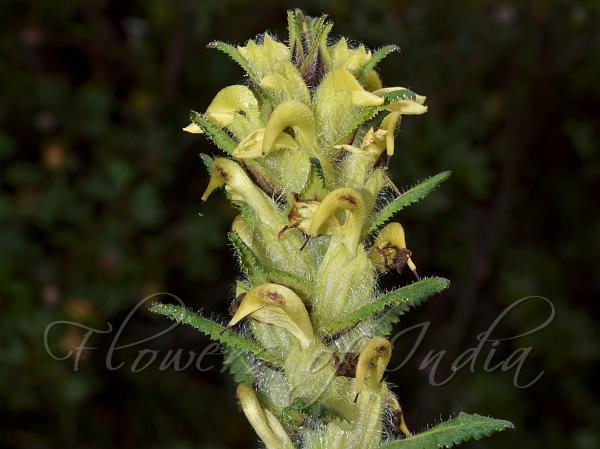|
| Tawang Lousewort |
|

|

| File size | 538131 |
| Original date | 8/22/19 12:31 PM |
| Resolution | 2048 x 1536 |
| Flash | Flash fired, return detected |
| Focal length | 48.0mm |
| Exposure time | 1/200s |
| Aperture | 14.0 |
| Focus Distance | |
| Metering Mode | Center weighted average |
| Camera make | NIKON CORPORATION |
| Camera model | NIKON D3300 |
| Sensor type | OneChipColorArea |
|
|
|
|
Photo: |
Botanical name: Pedicularis khoiyangii Family: Orobanchaceae (Broomrape family)
Tawang Lousewort is a new discovered (2020)
perennial, erect herbs, 0.5-2 m tall, becoming black after drying. It
is named after Late Mr. Hawtoo Khoiyang, a much admired botanist.
Flowers are borne at branch-ends, in dense racemes, many-flowered,
20-80 cm long, silky hairy; distal bracts ovate, shorter than flower,
proximal bracts leaf-like, longer than flowers. Flowers are 2.2-2.6 cm
long, nearly stalkless; flower-stalks 0.6-1 mm long, silky hairy.
Sepal-cup is bell-shaped, hairless inside, densely silky hairy outside,
membranous, 10-nerved, light yellowish-green; tube 1.0-1.2 cm long,
5-toothed; teeth triangular, equal, 1.8-2.2 mm long, margins entire.
Flowers are yellow, 2.1-2.5 mm long; tube 1.1-1.3 cm long, hairless
inside, sparsely velvet-hairy outside; galea boat-shaped, 9-11 mm long,
bent away from labium; labium as long as galea, 3-lobed, hairless
above, silky velvet-hairy beneath, margins fringed with hairs; lateral
lobes 4-5 x 1.8-2.2 mm, obovate; midlobe 4.5-6 x 2.5-3.5 mm, broadly
obovate. Stamens are arranged in pairs, all equal, inserted at the base
of flower tube, hairless; anthers 1.7-2 x 1.3-1.5 mm, yellow, filaments
1.2-1.5 cm long, cylindrical, hairless, pale white. Style is 2.0-2.5 cm
long, cylindrical, projecting 2.5-4.5 mm beyond galea. Stem is round,
rigid, fistular, striped, bristly; roots, stout, woody, rootlets many,
tuberous. Leaves are alternate, linear-lanceshaped, stem-clasping, 8-15
x 1.5-2.3 cm, pinnately divided, somewhat leathery, tip pointed, base
eared, above sparsely velvet-hairy, below velvet-hairy on midrib only,
midrib depressed above, prominent beneath; segments 18-22 pairs,
ovate-oblong, margins irregularly double toothed-sawtoothed. Capsules
are 1.4-1.7 cm long, oblong-ovoid, tip short tapering. Tawang Lousewort
is apparently endemic to the two localities, Sela pass and
Taktsang of Tawang District, Arunachal Pradesh, India. It is found in
Eastern Himalaya at 3700-4200 m altitudes, in rocky grassland and along
the stream beds, in alpine meadows and shrubberies. Flowering:
August-September.
| Identification credit: Dipankar Borah | Photographed in Tawang District, Arunachal Pradesh. |
• Is this flower misidentified? If yes,